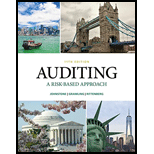
Auditing: A Risk Based-Approach (MindTap Course List)
11th Edition
ISBN: 9781337619455
Author: Karla M Johnstone, Audrey A. Gramling, Larry E. Rittenberg
Publisher: Cengage Learning
expand_more
expand_more
format_list_bulleted
Question
Chapter 2, Problem 10CYBK
To determine
Introduction:Professional skepticism is to be applied by auditors throughout its audit. It is referred to as having a questioning mind regarding the information as well as evidences obtained and considering inconsistencies carefully.
To examine:Whether the definition of professional skepticism is correct or not.
Expert Solution & Answer
Want to see the full answer?
Check out a sample textbook solution
Students have asked these similar questions
Explain why professional skepticism would be critical in assessing and responding to the risk of fraud.
Give specific examples of fraud risk factors - incentives, opportunities, and attitudes/rationalization.
What is the ethical value of applying the Fraud Triangle to assess the risk of material misstatements in the financial statements?
Chapter 2 Solutions
Auditing: A Risk Based-Approach (MindTap Course List)
Ch. 2 - The Great Salad Oil Swindle of 1963 is an asset...Ch. 2 - Prob. 2CYBKCh. 2 - Prob. 3CYBKCh. 2 - Prob. 4CYBKCh. 2 - The three elements of the fraud triangle include...Ch. 2 - Prob. 6CYBKCh. 2 - Prob. 7CYBKCh. 2 - Prob. 8CYBKCh. 2 - Prob. 9CYBKCh. 2 - Prob. 10CYBK
Ch. 2 - Prob. 11CYBKCh. 2 - Prob. 12CYBKCh. 2 - Prob. 13CYBKCh. 2 - Prob. 14CYBKCh. 2 - Prob. 15CYBKCh. 2 - Prob. 16CYBKCh. 2 - Prob. 17CYBKCh. 2 - Prob. 18CYBKCh. 2 - Prob. 19CYBKCh. 2 - Prob. 20CYBKCh. 2 - Prob. 21CYBKCh. 2 - Prob. 22CYBKCh. 2 - Prob. 23CYBKCh. 2 - Prob. 24CYBKCh. 2 - Prob. 1RQSCCh. 2 - Prob. 2RQSCCh. 2 - Prob. 3RQSCCh. 2 - Refer to Exhibit 2.1 a. What is a Ponzi scheme? b....Ch. 2 - Prob. 5RQSCCh. 2 - Prob. 6RQSCCh. 2 - Prob. 7RQSCCh. 2 - Prob. 8RQSCCh. 2 - Prob. 9RQSCCh. 2 - Prob. 10RQSCCh. 2 - Prob. 11RQSCCh. 2 - Prob. 12RQSCCh. 2 - Prob. 13RQSCCh. 2 - Prob. 14RQSCCh. 2 - Many consider the Enron fraud to be one of the...Ch. 2 - Prob. 16RQSCCh. 2 - Prob. 17RQSCCh. 2 - Prob. 18RQSCCh. 2 - Prob. 19RQSCCh. 2 - Prob. 20RQSCCh. 2 - Prob. 21RQSCCh. 2 - Prob. 22RQSCCh. 2 - Prob. 23RQSCCh. 2 - Prob. 24RQSCCh. 2 - Prob. 25RQSCCh. 2 - Prob. 26FFCh. 2 - Prob. 27FFCh. 2 - Prob. 28FF
Knowledge Booster
Similar questions
- When assessing the danger of substantial falsification of the financial accounts, what is the ethical value of utilizing the Fraud Triangle?arrow_forwardWhich of the following is not a principle relating to risk assessment? a. Identifies and analyses risks and respond to changes b. Designing the information systems c. Specifies objectives with sufficient clarity d. Considers the potential for fraud in assessing risksarrow_forwardHow does the study of criminology relate to the detection or deterrence of fraud? How does it differ from the study of accounting or auditing?arrow_forward
arrow_back_ios
arrow_forward_ios
Recommended textbooks for you
 Auditing: A Risk Based-Approach (MindTap Course L...AccountingISBN:9781337619455Author:Karla M Johnstone, Audrey A. Gramling, Larry E. RittenbergPublisher:Cengage LearningBusiness/Professional Ethics Directors/Executives...AccountingISBN:9781337485913Author:BROOKSPublisher:Cengage
Auditing: A Risk Based-Approach (MindTap Course L...AccountingISBN:9781337619455Author:Karla M Johnstone, Audrey A. Gramling, Larry E. RittenbergPublisher:Cengage LearningBusiness/Professional Ethics Directors/Executives...AccountingISBN:9781337485913Author:BROOKSPublisher:Cengage Auditing: A Risk Based-Approach to Conducting a Q...AccountingISBN:9781305080577Author:Karla M Johnstone, Audrey A. Gramling, Larry E. RittenbergPublisher:South-Western College Pub
Auditing: A Risk Based-Approach to Conducting a Q...AccountingISBN:9781305080577Author:Karla M Johnstone, Audrey A. Gramling, Larry E. RittenbergPublisher:South-Western College Pub

Auditing: A Risk Based-Approach (MindTap Course L...
Accounting
ISBN:9781337619455
Author:Karla M Johnstone, Audrey A. Gramling, Larry E. Rittenberg
Publisher:Cengage Learning

Business/Professional Ethics Directors/Executives...
Accounting
ISBN:9781337485913
Author:BROOKS
Publisher:Cengage

Auditing: A Risk Based-Approach to Conducting a Q...
Accounting
ISBN:9781305080577
Author:Karla M Johnstone, Audrey A. Gramling, Larry E. Rittenberg
Publisher:South-Western College Pub
